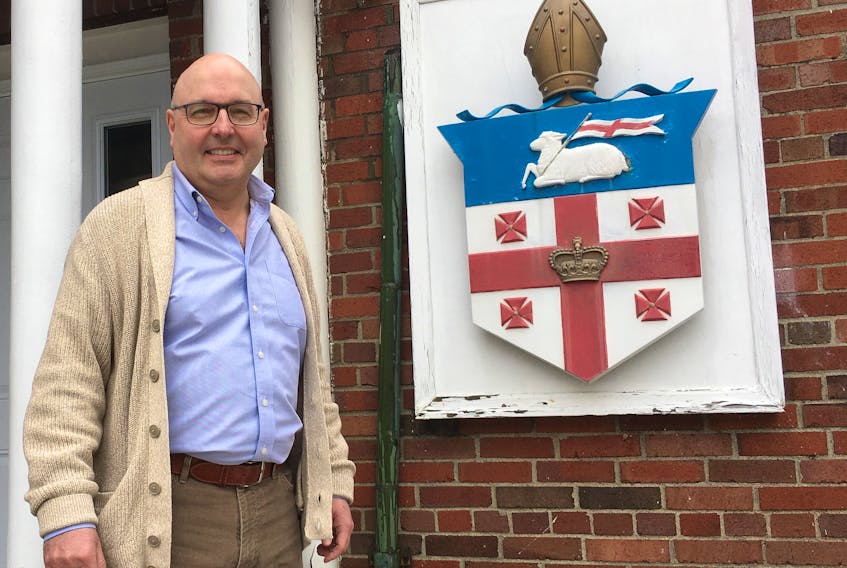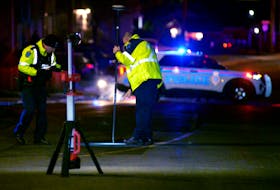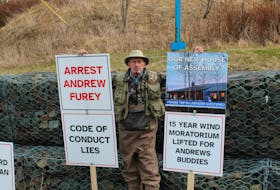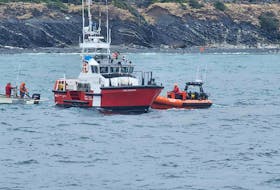ST. JOHN'S, N.L. — Horrendous periods in history, as devastating as they are, can also lead to positive changes, and the cholera outbreak of 1854 was reflected on by Anglican Bishop Geoff Peddle as he reminds people that this, too, shall pass.
Peddle, the bishop for the Anglican Diocese of Eastern Newfoundland and Labrador, wrote about the outbreak as he recently resumed his “Moments of Grace” after a one-year hiatus.
He decided to resume the snapshots of life in the church given the COVID-19 pandemic.
“Those recent events have changed just about everything. My church and my community have changed overnight, and I need to reflect upon that,” Peddle wrote.
“It was already a difficult winter for many of us with an abundance of snow that required extra effort to clear, forced many people indoors, and also kept worshippers away from church some Sundays. I was humbled to see the efforts that were made to reach out to one another and care for those particularly challenged by this winter. And then COVID-19 came like another storm.”
Peddle reflected on how people want to hear from him again through his weekly “Moments of Grace” column.
“I think a lot of people are just feeling the need to be cared for and connected,” he told The Telegram.

But he said it’s essential that people maintain physical distancing and find other ways to spend time together, through technology.
“And yet the power of a phone call is immense,” Peddle said.
He took January and February off to work on a history of the Church of England Orphanage in Newfoundland from 1855-69.
That orphanage was one of the positive changes that came out of the cholera outbreak of 1854, as it was founded after the church took in eight orphans and one widow.
The outbreak was an overwhelming tragedy, and killed about 500 people in St. John’s, Peddle noted.
As with the COVID-19 crisis, he said the public health emergency of 1854 changed everything overnight, and, like that crisis, new practices and safeguards will lead to lasting changes for the better.
“The cholera outbreak of 1854 led to improvements in sanitation and waste disposal in St. John’s. Greater care was taken in the growing and delivery of food and clean water, and there was an awareness that in order to prevent another such catastrophe things must be different in the future,” Peddle wrote.
COVID-19 has also upended society, and churches had to adapt rapidly.
“The cholera outbreak of 1854 led to improvements in sanitation and waste disposal in St. John’s. Greater care was taken in the growing and delivery of food and clean water, and there was an awareness that in order to prevent another such catastrophe things must be different in the future.” - Anglican Bishop Geoff Peddle
For the Anglican church in particular, that means connecting with parishioners by phone and offering services and prayers on the internet. Cathedral services are drawing more than 20,000 views.
Pastoral care in these times involves thousands of phone calls and emails each day, Peddle said.
(The diocese made the decision to not lay off anyone for four months when the public health emergency was declared, and will re-evaluate after that time.)
Pastoral staff are also helping make arrangements to pick up groceries for seniors, or drop off other essential items.
“I think the social connectedness is far greater than people realize,” Peddle told The Telegram.
“The things that are happening are just incredible. It’s very moving to realize what is going on.”

While Peddle’s research drew him to the parallel of the cholera outbreak, the focus of his work — a forthcoming book — is the history of the orphanage, which he has been working on for a couple of years.
Queen’s College, originally on Forest Road, was a hospital during the time of the outbreak, and in 1855, the Newfoundland Church of England Asylum for Widows and Orphans was created. It later became the Church of England Orphanage.
Nearly 2,000 children went through the orphanage until it closed in 1969, when it was located where the St. John's Arts and Culture Centre is now.
The boys were housed on a large swath of farm property, and the girls were housed at the former Exon House on Strawberry Marsh Road.

The story of the Anglican orphanage was a happy one, said Peddle.
The book was inspired by former residents Derrick Barbour and Adrian Heffernan, who grew up there in the 1950s.
Barbour told The Telegram he resided in the orphanage from about 1950-58.
The oldest of his family, he and his siblings were placed in the orphanage because his father (who subsequently died) was in the sanatorium with tuberculosis and his mother could not care for them.
Barbour was eight when he went to the orphanage, and the last year there, he said, he worked on the farm, tending vegetables and the dairy cows. The milk supplied the two orphanages, and some was sold to the public through the old Sunshine Dairy, he said.

The cows would graze on what is now the Prince Philip Parkway outside the St. John's Arts and Culture Centre and the surrounding farmland.
“They looked after us like we were their own children,” Barbour said of the couple who ran the orphanage.
“Those years in school, as in many schools, if you did something wrong, you got a strapping, but nothing out of the ordinary.”
After the orphanage, Barbour got a job at Bowrings, has been heavily involved in the Church Lads' Brigade (CLB) over the years and is a retired salesman.
He said that in the 1980s, he wrote a letter and tracked down friends from all over the world, resulting in a reunion that drew 150-200 former orphanage residents.
His lifelong friend, Adrian Heffernan, said there have been several reunions since then.
The Anglican orphanage, Heffernan said, is a wonderful church story, and the bonds he made with fellow residents in the 1950s continue to this day. He also said that although he was sad during his childhood, the orphanage was the best thing that could have happened to him.
“The same trees we threw rocks at to get chestnuts are there to this day,” Heffernan recalled in fondness.
Heffernan said his father grew up in the now-infamous Christian Brothers-operated Mount Cashel Orphanage, was a Buchans miner and died at the age of 29 from stomach ulcers while working at the Fort Pepperrell American military base in Pleasantville.

Heffernan’s mother was a switchboard operator in the Goulds, but could not make ends meet, and his grandfather used his influence as a Anglican church warden to get him into the Church of England Orphanage.
His sisters went to Exon House.
Heffernan's mother rode the bus every Sunday to visit them.
“I was treated well there,” said Heffernan, a former hockey referee and Westinghouse employee, as well as a CLB member who rose up through its ranks.
“I got my education. A lot of poor kids in St. John’s didn’t have what we had. … We had lots of food. You realize those things later in life.”
@BarbSweetTweets









